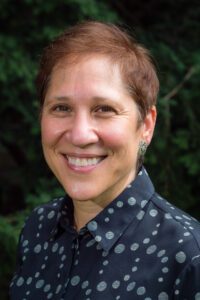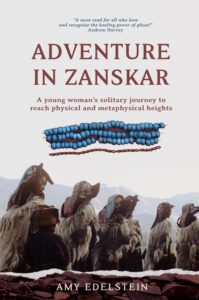 Amy Edelstein is an award-winning author, educator, and founder of Inner Strength Education, an innovative mindfulness and systems thinking program which has empowered more than 17,000 teens in under-resourced schools in Philadelphia. Inner Strength received the coveted CASEL-recommended designation and Amy was honored with a Philadelphia Social Innovation Award for the organization’s work in violence reduction. She has 40+ years of meditation practice and has researched, published about, and taught both Eastern and Western philosophies for twenty years. She is a Cornell University College Scholar and author of six books, including the bestsellers The Conscious Classroom and Adventure In Zanskar, her latest memoir. More on www.AmyEdelstein.com and www.InnerStrengthEducation.org
Amy Edelstein is an award-winning author, educator, and founder of Inner Strength Education, an innovative mindfulness and systems thinking program which has empowered more than 17,000 teens in under-resourced schools in Philadelphia. Inner Strength received the coveted CASEL-recommended designation and Amy was honored with a Philadelphia Social Innovation Award for the organization’s work in violence reduction. She has 40+ years of meditation practice and has researched, published about, and taught both Eastern and Western philosophies for twenty years. She is a Cornell University College Scholar and author of six books, including the bestsellers The Conscious Classroom and Adventure In Zanskar, her latest memoir. More on www.AmyEdelstein.com and www.InnerStrengthEducation.org
Below is an extract from Adventure In Zanskar by Amy Edelstein © 2021 Amy Edelstein. Reprinted with permission from Emergence Education Press, Philadelphia, PA. www.emergenceeducation.com. [pp. 157-161]
~ ~ ~
I set up camp by a circle of rocks. Like cloud cover, a strange sleep descended over me, thick, misty, and dreamy without any clear forms.
When I awoke and started gathering myself for this next stretch, I felt an unfamiliar calm. The usual small mosquito itches of plans and things to accomplish had receded and the constant ticker of self-analysis and self-criticism had turned off. It was quiet on the Wall Street of my mind. I was used to making so much effort in meditation, it was so unfamiliar to let my mind be as it was. My gears had downshift-ed and while I was still running smooth and easy, I wasn’t needing to spin so fast and chase so much. Breathing felt rich, drinking in the nutrients of the bright air. I ate, packed, and continued north. It looked like the way would be fairly easy for most of the day, level on a high valley floor.
I was enjoying the walk, a light green covered much of the valley, little plants brightening up the earth. The valley was happy, laughing in the way contours and shapes do sometimes. Late morning, I heard the tinkling of horse bells coming up from behind me. Two Zanskaris with three horses were catching up to me. Two horses were only lightly packed, and a third just held a blanket and light wooden saddle frame. We exchanged greetings and the familiar back and forth of wayfarers. Where are you heading? Where have you come from? What is your name?
We found we were heading the same direction for the rest of the day. Karma and Yeshe were meeting a herder, where they’d leave two of the horses and continue on to Leh. They hoisted my pack onto the white pony with the empty saddle and we started walking. Karma chewed a stalk of lemony grass that rolled and bobbed like an unlit cigar, Yeshe, the more talkative of the two, walked next to me. I asked what I could and told what I could, then proceeded to learn the names of everything I could see in my surroundings. We laughed a lot, stopped for tea periodically, and the day felt as lighthearted as we were.
While we walked on wide flat ground, the path gradually rose higher and higher until the valley floor was a good five hundred meters above the river. There was plenty of room between us and the wall of mountains, maybe a half-hour walk but the path skirted closer to the edge that dropped to the river. Yeshe and I walked ahead with one of the horses, while our grass nibbling friend followed up the rear with the white pony and the other small brown horse. Horses smell good, their tight muscles and short fur catch the light. The horse we walked with had colorful threads braided into its halter, and though dusty its mahogany-black coat gleamed. Horses have a presence. Not like people but they have their own being-ness. It was soothing to be with them. We kept moving, Yeshe singing songs under his breath.
After some time had passed, we realized we seemed to have lost the other horse driver. My friend whistled low piercing whistles and calls that echoed down the canyon but Karma didn’t answer. It was odd that he’d be so far behind us to be out of earshot, we were only moving at a moderate pace. No worry, was Yeshe’s attitude. We stopped and propped our walking sticks against a boulder, waiting for him to catch up. It must have been just over an hour when Karma showed up small in the distance. It seemed like only one horse was following but I figured it must be my eyesight.
When he arrived, true enough, Karma only had one of the two horses he’d been walking with and he was carrying my pack on his back. I searched his face for clues as to what might have happened. Did he cross paths with a friend and pass on the white pony? Did he leave the horse to graze and decide to come back for him later? There didn’t seem to be a problem, Karma’s expression was calm and even. He was even smiling and shaking his head as he described to Yeshe what had happened. They talked a lot and I began to piece together the story.
It seemed the pony had spooked. All of a sudden, it broke into a gallop, heading straight to the edge of the cliff. The horse ran north along the edge, tossing his head and shaking as if he wanted to free himself of a demon on his back. Karma whistled and called. He quickly secured the other horse’s reins under a heavy boulder so he wouldn’t follow and then shouted and clapped and walloped his thighs to break the horse’s fright, all the while running as fast as he could. He ran but the horse was too far ahead and too wild. Then his hooves hit a soft part of the embankment. The ground gave way, crumbling over the edge. The horse slipped, flailed its legs, and tumbled over the cliff.
Karma, breathless, reached the spot, the horse had met a quick and painless end on a rocky outcrop not too far down the slope. The river steamed another few hundred meters below, it was fortunate the ledge had broken the horse’s fall. Karma climbed down the side of the embankment. He stroked the top of the horse’s head, reciting mantras, allowing the horse’s life essence to settle, allowing the fear to dissipate, reminding the horse of what a faithful servant he had been, how many sacks of tsampa he had carried to the monasteries for great pujas, how many Rinpoches he had traveled with. In this way, he helped guide the horse’s consciousness into the bardo, the in-between state between one life and the next, with the mantras and good deeds to calm and carry his spirit through so it could find its way to a better rebirth, one where it could hear and practice the dharma, and keep moving on the path towards enlightenment.
When it felt like the disturbance had settled, Karma untied my pack and the saddle, lifted the blankets, and carried it all on his back up the side of the hill back to the valley floor. He packed some on the brown pony’s back but took my rucksack on his own.
As he finished recounting his story, Yeshe, who’d been making a fire and heating tea the whole time, filled his cup, poured some dried yak cheese into his friend’s hand, and shook his head back and forth.
“We are all going to die one day. We never know when. We think it might be too soon. But we die at just the right time. We must always be ready, it is the way of things. It is so, the wheel of birth and death, the wheel of becoming. That’s why we must practice the dharma, so when the time comes there will be no grasping or fear and we can stay calm through the great terror of the bardo and direct our rebirth into a beneficial realm.”
Karma nodded his head, blew on his steaming tea, and chewed the nuggets of dried cheese. This was the way of things.
Was it somehow my fault? I worried. Was it the foreign smell of my pack that spooked the horse? I tried to express my concern and regret and offer to compensate them for the horse. I don’t know if they fully understood me, but they just kept shaking their heads no. Their equanimity was so complete, they seemed to embrace this turn of events as day embraces night. They had already moved on.
 After all the lost time, Yeshe explained that they needed to travel more quickly to reach their destination be- fore nightfall. I thanked them and took my pack. They quickly disappeared into the distance ahead of me and were soon out of sight.
After all the lost time, Yeshe explained that they needed to travel more quickly to reach their destination be- fore nightfall. I thanked them and took my pack. They quickly disappeared into the distance ahead of me and were soon out of sight.
I slowed down and when I found a good place to camp for the night in a wide part of the valley, I stopped. Though it was colder here than against the mountainside, I was able to watch the great dome of stars overhead and reflect on the day.
The horseman’s equanimity was so genuine it was as if there was no other way to react. For me, all the examples of loss I’d seen in my culture, a car dinging someone else’s fender, a plate slipping out of a hand and shattering on the floor, a friend moving away from the neighborhood were accompanied with intense emotion. Anger, frustration, denial sadness, or regret.
For Karma and Yeshe, there really weren’t any emotional disturbances. Neither swore, complained, insisted it be otherwise, or blamed me. I felt it must have been my foreign smell that startled the horse but since they weren’t sure, they didn’t assume to know what they didn’t know. That animal must have been a big part of their wealth and livelihood. But as is part of the magic and the depth of practice in this valley, they accepted life, death, fortune, and misfortune equally and continued on.
Finally, I fell asleep under the midnight blue.


